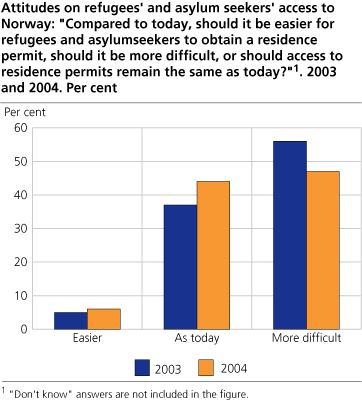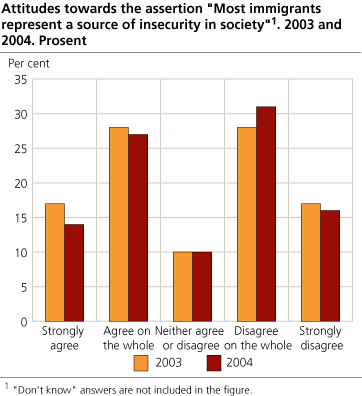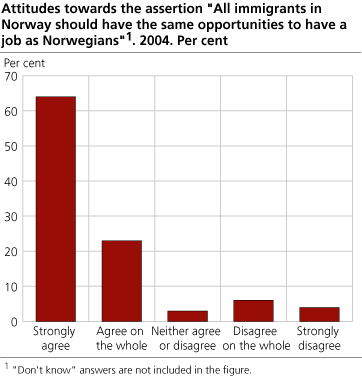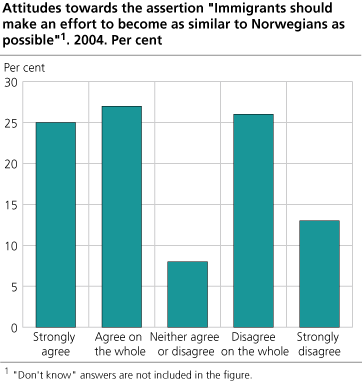Content
Published:
This is an archived release.
Support for status quo - fewer want stricter asylum policy
The share of people who support the current asylum policy or a more liberal policy increased by 8 percentage points from 2003 to 2004. 6 per cent think that it should become easier to be granted asylum status, whereas 44 per cent want the current policy to continue. These results are based on the annual survey on attitudes towards immigrants and immigration carried out by Statistics Norway
In 2003, 37 per cent supported the current asylum policy. The fact that fewer people now want a stricter regime (47 per cent against 56 per cent in 2003) must be viewed in light of the fall in the number of asylum seekers and a stricter asylum policy. In 2003, roughly 15 600 people applied for asylum in Norway (2 000 less than in 2002), and this figure is expected to fall below 9 000 in 2004.
Although this year's survey reveals a significant increase in the share of people who support the current asylum policy or a liberalisation of the asylum policy, this figure has fallen steadily in recent years - from 71 to 42 per cent from 1999 to 2003. The main reasons behind the decrease may be a combination of increased control measures from the government, resulting in greater focus on false asylum applications in public opinion. The number of asylum seekers increased throughout most of the period, a fact that probably played an equally important part.
Stable attitudes towards immigrants
The survey shows that attitudes towards settled immigrants are more or less unchanged from last year. Two thirds of the population 'strongly agree' or 'agree on the whole' that immigrants make a valuable contribution to the Norwegian working life, and nine out of ten believe that immigrants should have the same labour market opportunities as the rest of the population. Four out of ten, however, believe that immigrants abuse the social welfare system and that immigrants are a source of increased insecurity in society. Only one out of ten is reluctant to have an immigrant as a neighbour or home help, but 35 per cent would dislike that their son or daughter married an immigrant.
Majority want immigrants to be more like Norwegians
A small majority (53 per cent) want immigrants to be more like Norwegians, whereas four out of ten disagree. Those who want immigrants to adapt to the Norwegian culture are also most critical to immigration in general.
Education, age and place of residence affect attitudes
Education is the single most important background factor in determining attitudes towards immigrants and immigration. The more education, the more likely a person is to be positive towards immigrants. This leads to differences in attitudes by age given that young adults (25-44 years) tend to have more education than people who are younger and older than them. The oldest age group is more sceptical than younger age groups. Most frequently the young adults are most positive towards immigration. But when it comes to accepting an immigrant as a potential son- or daughter-in-law, the youngest group (16-24 years) is the most positive. The youngest group is also least inclined to support assimilation of immigrants in the Norwegian society.
People living in urban areas are more positive towards immigrants than people from rural areas, and people living in Oslo/Akershus are more positive than people from other parts of the country. Although not surprising, there is a correlation between attitudes towards immigrants and party preference. Respondents who voted for the Red Electoral Alliance or the Socialist Left Party were more likely to be positive towards immigrants than respondents who voted for the Progress Party. On some questions the Liberal Party and the Christian Democrat Party voters were marginally more positive than voters on left side of the political sphere.
Two out of three have contact with immigrants
67 of the respondents report that they have some contact with immigrants. People who have social contact with immigrants tend to be more positive towards immigrants than others. In addition, there is positive correlation between positive attitudes and the number of arenas for contact and number of immigrants involved.
The results are taken from a survey of attitudes towards immigrants and immigration, and the questions are part of Statistics Norway's omnibus survey.
Tables:
- Table 1 Attitudes towards six assertions on immigrants. 2002- 2004. Per cent
- Table 2 Attitudes towards the assertion "All immigrants in Norway should have the same opportunities to have a job as Norwegians". 1993-2000 and 2000-2004. Per cent
- Table 3 Attitudes towards refugees access to the country. 2002-2004. Per cent
- Table 4 Answers to three questions on relation to immigrants. 2002-2004. Per cent
- Table 5 Contact with immigrants on different arenas. 2002-2004. Per cent
- Table 6 Number of arenas where contact with immigrants takes place. 2002-2004. Per cent
- Table 7 Number of immigrants one has contact with. 2003-2004. Per cent
Contact
-
Frøydis Strøm
E-mail: froydis.strom@ssb.no
tel.: (+47) 40 81 13 17
-
Christian Sørlien Molstad
E-mail: christian.molstad@ssb.no
tel.: (+47) 46 65 99 12




